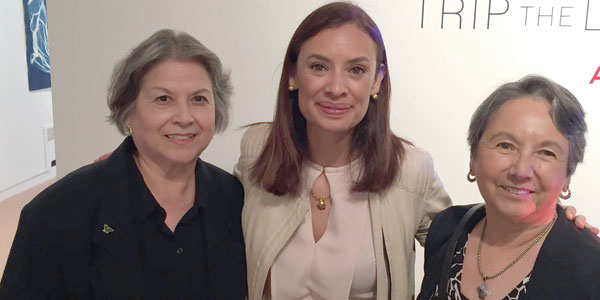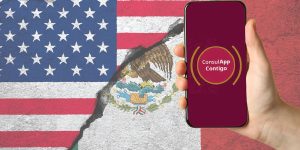
“¿Dónde estarán los latinos en 100 años?”
Esa fue la pregunta que planteo María Teresa Kumar, el martes (12 de abril) a la audiencia en el Auditorio Pierson de la Universidad de Missouri-Kansas City durante la Lectura de César Chávez. Organizada por la División de Diversidad e Inclusión de la Universidad de Kansas City, la serie invita a figuras latinas clave cada año para hablar acerca de varios temas sociales que afectan a las familias e individuos de la comunidad latina.
Después de explicar cómo los acontecimientos de los últimos 100 años han afectado a los latinos en los Estados Unidos, Kumar reflejó en el estado actual de los latinos y su creciente interés en la votación para las elecciones de este año.
“El hecho de que (los políticos) están tratando de privar a los latinos de sus derechos para votar es porque tienen miedo del poder de la comunidad latina”, dijo Kumar. “Todo depende de nosotros para asegurarse de que nuestra voz sea escuchada; pero hay que registrarse, votar y hacer que nuestros amigos y aliados lo hagan también “.
Kumar es la directora ejecutiva de Voto Latino, una organización que se centra en educar a la comunidad sobre el sistema de votación, el registro de votantes y el fomento de una mayor representación de los latinos para postularse a cargos políticos.
“La población latina es una de las comunidades más grandes de los EE.UU. – y, sin embargo, no es justamente representada en nuestros libros de historia, en los medios, ni el gobierno”, dijo Kumar. “Menos del 3 por ciento de los funcionarios del gobierno son latinos.”
Kumar mencionó también que, con el fin de proliferar los esfuerzos de los latinos en los derechos civiles y la justicia social, los latinos necesitan el apoyo de aliados que también están luchando por las causas de justicia social similares, como la comunidad LGBT y los activistas Afroamericanos de Black Lives Matter.
Para obtener más información sobre la conferencia de este año o conferencias anteriores, visite http://info.umkc.edu/diversity/. Para aprender más acerca de Voto Latino, visite http://votolatino.org/.
Voto Latino CEO speaks at UMKC
By Melissa Arroyo, photos by Michael Alvarado
“Where will Latinos be in 100 years?”
That was the question Maria Teresa Kumar posed on Tuesday (April 12) to the audience in Pierson Auditorium for the University of Missouri-Kansas City’s (UMKC’s) Cesar Chavez Lecture Series. Hosted by UMKC’s Division of Diversity and Inclusion, the series invites key Latino figures each year to discuss several social issues affecting families and individuals in the Latino community.
After explaining how the events of the past 100 years have affected Latinos in the United States, Kumar reflected on the current state of Latinos and their increased interest in voting for this year’s elections.
“The fact that (politicians) are trying to disenfranchise the vote is because they are afraid of the power of the Latino community,” Kumar said. “It’s up to us to make sure that our voice is heard; but we have to register, vote, and get our friends and allies to do it, too.”
Kumar is the CEO of Voto Latino, an organization that focuses on educating the community about the voting system, registering eligible voters and encouraging a higher representation of Latinos running for political office.
“The Latino population is one of largest communities in the U.S. – and yet, it is not fairly represented in our history books, in the media, nor the government,” Kumar said. “Less than 3 percent of government officials are Latino.”
Kumar also mentioned that, in order to proliferate the efforts of Latinos in civil rights and social justice, Latinos need the support of allies who also are petitioning for similar social justice causes, such as the LGBT community and the Black Lives Matter activists.
To learn more about this year’s lecture or previous lectures, visit http://info.umkc.edu/diversity/. To learn more about Voto Latino, visit http://votolatino.org/.










